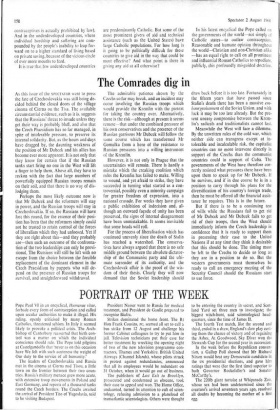The Comrades dig in
As this issue of the SPECTATOR went to press the fate of Czechoslovakia was still being de- cided behind the closed doors of the village cinema of Cierna on the Tisa. The available circumstantial evidence, such as it is, suggests that the Russians' threat to invade unless they get their way is probably bluff, and also that the Czech Praesidium has so far managed, in spite of intolerable pressure, to preserve its internal solidarity. But, as the hours and days have dragged by, the daunting weakness of the position of Mr Dubcek and his allies has become ever more apparent. It is not only that they know for certain that if the Russian tanks start firing no one in the West will lift a finger to help them. Above all, they have to reckon with the fact that large numbers of powerfully equipped Russian troops remain on their soil, and that there is no way of dis- lodging them.
Perhaps the most likely outcome now is that Mr Dubcek and the reformers will stay in power, and the Russian troops will stay in Czechoslovakia. If so, the Russians will have lost this round, for the essence of their posi- tion has been that the reformers simply could not be trusted to retain control of the forces of liberalism which they had unloosed. Yet if they are right about this—and they probably are—then such an outcome of the confronta- tion of the two leaderships can only be provi- sional. The Russians will still be left with no escape from the choice between the forcible replacement of the dominant element in the Czech Praesidium by puppets who will de- pend on the presence of Russian troops for survival, and straightforward withdrawal. The admirable patience shown by the Czechs so far may break, and an incident may occur involving the Russian troops which would provide the Kremlin with the pretext for taking the country over. Alternatively, there is the risk—although at present it seems remote—that under the combined pressure of his own conservatives and the presence of the Russian garrisons Mr Dubcek will follow the same course which has transformed Mr Gomulka from a hero of the resistance to Russian pressures into a willing instrument of the Kremlin.
However, it is not only in Prague that the uncertainties will remain. There is hardly a mistake which the creaking coalition which rules the Kremlin has failed to make. Willing to wound, and yet afraid to strike, they have succeeded in turning what started as a con- troversial, possibly even a minority campaign for greater freedom of expression, into a national crusade. For weeks they have given a public exhibition of indecision and, al- though an outward façade of unity has been preserved, the signs of internal disagreement have been unmistakable. It seems inevitable that some heads will roll.
For the process of liberalisation which has continued unevenly since the death of Stalin has reached a watershed. The conserva- tives have always argued that there is no safe middle ground between the absolute dictator- ship of the Communist party and the ulti- mate surrender of its authority, and the Czechoslovak affair is the proof of the wis- dom of their thesis. Clearly they will now demand that the Soviet leadership should draw back before it is too late. Fortunately in the fifteen years that have passed since Stalin's death there has been a massive em- bourgeoisement of the Soviet Union, and with luck it may be too late already. But the pre- sent uneasy compromise between the Krem- lin's radicals and traditionalists cannot last.
Meanwhile the West will face a dilemma. By the unwritten rules of the cold war, which neither side can transgress except at in- tolerable and incalculable risk, the capitalist countries can no more intervene directly in support of the Czechs than the communist countries could in support of Cuba. The governments of the West have therefore cor- rectly resisted what pressures there have been upon them to speak up for Mr Dubcek. If he survives, and if in due course he is in a position to carry through his plans for the diversification of his country's foreign trade, then he must be offered all the financial assis- tance he requires. This is in the future.
But if there is to be a continuing test of wills while the Russians fail to get rid of Mr Dubcek and Mr Dubcek fails to get rid of their troops, then the West should immediately inform the Czech leadership in confidence that it is ready to support them in presenting their case to the United Nations if at any time they think it desirable that this should be done. The timing must be left to the Czechs to decide so long as they are in a position to do so. But the western governments must themselves be ready to call an emergency meeting of the Security Council should the Russians start to use force.






































 Previous page
Previous page